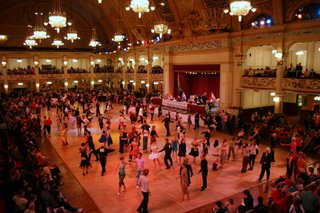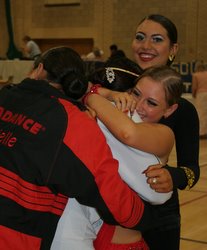Introduction
Editorial: With so many people from the school qualifying for the Nationwide finals at Blackpool next April this is a very timely article on how we should all be preparing for this, the biggest competition of our year. There are some great tips on psychology and really helpful advice, I know I'll be applying the ideas suggested. Many thanks for getting our News, Views & Features section off to a flying start
Published
Saturday November 04 2006
, by Andrew Dancer
Preparing for Blackpool

Paula, Gilli and Mark must be quite proud of the recent achievements and very excited with the potential they have for next year. This is a relatively small school compared to some of the others we compete against. Yet we always seemed to have finalists in any event we enter. What is interesting is that when these last two weekends are used as benchmarks for Blackpool, the prospects are exciting!
However, each competitive dancer still needs to decide what it is they want to accomplish, at Blackpool. There is a big difference between just competing and wanting to get to finals; and before you have a chance of winning you need to believe it is possible.
"If you believe you can, you probably can. If you believe you won't, you most assuredly won't. Belief is the ignition switch that gets you off the launching pad."
- Denis Waitley
Your limitations are self imposed, by what you believe. If you expand your belief in your own abilities, your chances of accomplishment improve.
"The good Lord gave you a body that can stand almost anything. It's your mind you have to convince."
- Vincent Lombardi
Unfortunately many of us do not prepare correctly. Most dancers probably come to their lesson once, maybe twice a week with no clear objective to what they hope to achieve. They go to competitions unprepared, with no strategy or game plan. The result is they get knocked out and then sit around wondering what went wrong, often looking to blame the judges, coaches or anyone else. At some point they need to come to the realization that there is probably something wrong with their approach.
The list of excuses why we do not perform our best are endless. Such as:
- I don't have time to practice.
- I don't feel well.
- I hate practicing its boring.
- This competition is not important to me.
- I do not have the best partner.
- I do not have the right partner.
- My routine is not fancy enough.
- I can't remember the routine.
- I cannot afford too many lessons.
- What's the point I will never be able to beat the top dancers.
These obstacles, negative thoughts pre-exist in our mind and are a reflection of our commitment. However they are nothing more than our mind giving our body permission to fail - they're a pre-existing justification for poor performance! Failure often leads to low expectations, which in turn results in minimal preparation that inevitably results in more failure. The challenge is to maintain a positive attitude when you do not get the results you hoped for. Some people respond to failure by "falling apart;" others try harder. They take Positive Action.
Accept that you can only control the controllable. Do not get hung up on who you will compete against or who the judges may be. You have no control over how the other competitors will perform or how the judges will mark. But you can control your own performance. You need to prepare to dance to the best of your ability. On the day, dance to perform and not to compete.
So what you need is something to keep you focused and on track, you need to establish your own game plan i.e. a strategy.
 Firstly, establish and focus on your ultimate goal, be it winning, getting to finals or even just getting a call-back. Set short-term goals that are quickly attainable and can be used as stepping stones, ( e.g. learn the correct basic hip action in a rumba walk). These will lead to the achievement of long term goals, (e.g. learn the basics ? learn routines ? get a call-back ? semi-final ? final ? Win). By doing this, one small step at a time, you prove to yourself that you are able to perform and achieve effectively.
Firstly, establish and focus on your ultimate goal, be it winning, getting to finals or even just getting a call-back. Set short-term goals that are quickly attainable and can be used as stepping stones, ( e.g. learn the correct basic hip action in a rumba walk). These will lead to the achievement of long term goals, (e.g. learn the basics ? learn routines ? get a call-back ? semi-final ? final ? Win). By doing this, one small step at a time, you prove to yourself that you are able to perform and achieve effectively.
Next, decide if you're committed enough to make the inevitable sacrifices that are necessary to improve.
Now, make use of mental imagery - picture yourself with the prize! No matter how silly you may think it is. The simple act, of creating a visual image, of yourself having successfully achieved your objective and visualizing it every day, can have a positive effect. Imagine yourself in a specific environment, performing your moves correctly and successfully. See yourself enjoying the activity and feeling satisfied with your performance. Focus on the actions, not on the outcome. Perform as you would like to perform in real life.
"We try to practice every day, if possible but we do have days without training too. Our practice has to involve a mental element, running your routines around is not good enough no matter how much you do it. You always have to have a vision of what you are trying to achieve, otherwise you will not achieve anything."
- Sergey Ryupin (UK Open Professional Rising Star Latin 2000)
Lessons alone will not make you a better dancer. The key is to prepare mentally, tell yourself that you are good enough. And then practice, practice, practice - outside of having lessons. If you are truly motivated, make the decision to commit and turn up to training on a regular basis. In addition, decide how much you are prepared to give in each training session. Remember, you win in the preparation, not in the competition and that preparation is what will win you trophies.
Keep in mind that it must be tiring and boring for your teachers to constantly be going over the same things they taught the week or weeks before, without seeing any commitment and/or improvement. For them to be interested and motivated they need to see you putting in the extra effort. Take every opportunity, offered by the school, for you to practice. Watch and study the more accomplished dancers (at the school and at competitions), to remind yourself what it is you are striving to become!
"Winning is not a sometime thing. It's an all time thing. You don't win once in a while. You don't do things right once in a while. You do them right all the time. Winning is a HABIT!"
"When I get tired and want to stop, I wonder what my opponent is doing, is he still working out. I try to visualise him still working. Then I push myself harder."
"Everyone wants to win, but not everyone is willing to prepare to win."
"The difference between a good athlete and a top athlete is the top athlete will do the mundane things when nobody's looking."
- Susan True
"Perfect practice makes perfect" - you need to be practicing the correct things, otherwise, you will just end up being very good at executing the wrong movements, which will be very hard to correct later on.
".. You have to go and do it all, over and over and over again, to make it your dance experience and your knowledge."
- Jukka Haapalainen four-times world champion
"Winners don't do different things, they do things differently".
- Shiv Khera
"Those who truly have the spirit of champions are never wholly happy with an easy win. Half the satisfaction stems from knowing that it was the time and the effort you invested that led to your high achievement."
- Nicole Haislett
Becoming a winner means first thinking like a winner. You can count on this - the person, who comes first, at Blackpool, will be the one that made the commitment to win. Establish your goal, visualise yourself achieving it and commit to win!